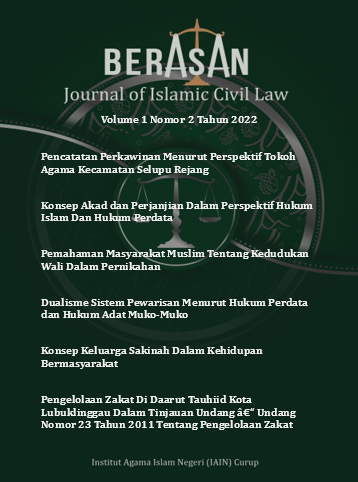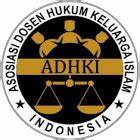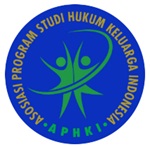Pemahaman Masyarakat Muslim Tentang Kedudukan Wali Dalam Pernikahan
DOI:
https://doi.org/10.29240/berasan.v1i2.6041Keywords:
Guardian of the marriage, marriageAbstract
The purpose of this study is to describe the understanding of the muslim community about the position of guardians in Islam. The research method used is descriptive qualitative research. The data is extracted from primary data sources, namely the results of interviews with predetermined informants, secondary data sources are taken from references relevant to this research. The results showed that the majority of people did not understand the position of the guardian in marriage. Thus, the government in the field of Islamic religious education must make the content of the guardian position in Islam. This is very important for the validity of the marriage that will be carried out by both husband and wife and their offspring
Downloads
References
Daud, Fathonah K., and Ramdani Wahyu Sururuie. “Otoritas Wali Nikah Dalam Islam: Analisis Perkawinan Tanpa Wali Di Indonesia Perspektif Fiqh Dan Hukum Positif.†Akademika 15, no. 2 (2021). https://doi.org/10.30736/adk.v15i2.544.
Iftidah, Ida. “PANDANGAN MASYARAKAT TENTANG TAUKIL WALI: Studi Di Desa Dempet Kabupaten Demak.†Al-Ahwal: Jurnal Hukum Keluarga Islam 9, no. 1 (2017). https://doi.org/10.14421/ahwal.2016.09106.
Jalil, Husni A., and Tia Wirnanda. “Wali Nikah Fasik (Studi Perbandingan Mazhab Hanafi Dan Mazhab Syafi’i).†Media Syari’ah 22, no. 1 (2020). https://doi.org/10.22373/jms.v22i1.6533.
Kasim, Dulsukmi. “Analisis Hadis Wali Nikah Dan Aktualisasi Hukumnya Dalam Konteks Gorontalo.†Jurnal Ilmiah AL-Jauhari: Jurnal Studi Islam Dan Interdisipliner 4, no. 2 (2019). https://doi.org/10.30603/jiaj.v4i2.1124.
Martinelli, Ida. “Status Hukum Anak Luar Kawin Pasca Putusan Mahkamah Konstitusi Nomor 46/Puu-Viii/2010.†DE LEGA LATA: Jurnal Ilmu Hukum 1, no. 2 (2017).
Misran, and R. M. Dian Murdiana. “Pandangan Tengku Gampong Tentang Wali Fasik Dalam Pernikahan (Studi Kasus Di KUA Kecamatan Blangpidie, Abdya).†Samarah 3, no. 2 (2019). https://doi.org/10.22373/sjhk.v3i2.4398.
Moch. Azis Qoharuddin. “Kedudukan Wali Adhal Dalam Perkawinan.†El-Faqih : Jurnal Pemikiran Dan Hukum Islam 4, no. 2 (2018). https://doi.org/10.29062/faqih.v4i2.44.
Nasution, Agung Sahbana, Sutrisna Sutrisna, and Syarifah Gustiawati. “Kewenangan Ayah Biologis Menjadi Wali Nikah Bagi Anak Hasil Zina Menurut Pandangan Imam Syafi’i Dan Putusan Mahkamah Konstitusi (MK) NO. 16/PUU-VIII/2010.†As-Syar’i: Jurnal Bimbingan & Konseling Keluarga 4, no. 2 (2021). https://doi.org/10.47467/as.v4i2.819.
Nurbaeti, Siti. “Hadis Tentang Nasab Anak Zina Dalam Perspektif Ibnu Qayyim Al-Jauziyyah.†Holistic Al-Hadis 4, no. 2 (2018). https://doi.org/10.32678/holistic.v4i02.3232.
Rasyid, Ahmad. “Pemikiran Ibnu Qayyim Al-Jauziyyah Tentang Wali Mujbir Dalam Pernikahan (Perspektif Hak Asasi Anak).†Jurnal Studi Agama Dan Masyarakat 12, no. 2 (2017). https://doi.org/10.23971/jsam.v12i2.465.
Rohmat. “Kedudukan Wali Dalam Pernikahan : Studi Pemikiran Syâfi ’ Îyah , Hanafiyah ,.†Al-Adalah, 2011.
Rohmat, Rohmat. “Kedudukan Wali Dalam Pernikahan: Studi Pemikiran Syãfiâãyah, Hanafiyah, Dan Praktiknya Di Indonesia.†Al-´Adalah 10, no. 2 (2011).
Wati, Lisna. “Analisis Terhadap Fatwa MUI No. 11 Tahun 2012 Tentang Kedudukan Anak Hasil Zina Dan Perlakuan Terhadapnya.†Skripsi, no. 11 (2016).
Downloads
Published
Issue
Section
Citation Check
License
Authors who publish with Berasan: Journal of Islamic Civil Law agree to the following terms:
- Authors retain copyright and grant the journal right of first publication with the work simultaneously licensed under a Creative Commons Attribution-NonCommercial-ShareAlike 4.0 International License (CC BY-NC-SA 4.0) that allows others to share the work with an acknowledgment of the work's authorship and initial publication in this journal.
- Authors are able to enter into separate, additional contractual arrangements for the non-exclusive distribution of the journal's published version of the work (e.g., post it to an institutional repository or publish it in a book), with an acknowledgment of its initial publication in this journal.
- Authors are permitted and encouraged to post their work online (e.g., in institutional repositories or on their website) prior to and during the submission process, as it can lead to productive exchanges, as well as earlier and greater citation of published work (See The Effect of Open Access).









